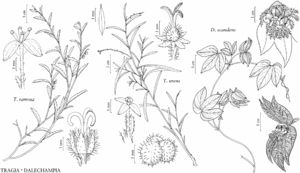Tragia urens
Sp. Pl. ed. 2, 2: 1391. 1763.
Herbs or subshrubs, 2–5 dm. Stems erect, green to purple-green, apex never flexuous. Leaves: petiole 0–2 mm; blade usually oblanceolate to linear, sometime elliptic, 2–8(–10) × 0.2–1.4 cm, base acute, margins entire or irregularly and shallowly sinuate, apex acute. Inflorescences terminal (often appearing leaf opposed), glands absent, staminate flowers 3–45 per raceme; staminate bracts 1–1.5 mm. Pedicels: staminate 1.3–2 mm, persistent base 0.3–0.6 mm; pistillate 3.5–4 mm in fruit. Staminate flowers: sepals 4–5, green, 1–1.5 mm; stamens 2, filaments 0.2–0.4 mm. Pistillate flowers: sepals linear, 1–1.8 mm; styles connate 1/4–1/3 length; stigmas undulate. Capsules 7–8 mm wide. Seeds brown with tan streaks, 3–4 mm. 2n = 44.
Phenology: Flowering late spring; fruiting summer–fall.
Habitat: Dry, sandy pinelands, oak barrens, disturbed fields.
Elevation: 0–300 m.
Distribution
Ala., Fla., Ga., La., Miss., N.C., S.C., Tex., Va.
Discussion
Tragia urens is widespread from the Gulf Coast to the mid-Atlantic states and displays considerable foliar variation. Leaf blades that usually are oblanceolate to linear with entire to sinuate margins, two stamens, and sparse, stinging hairs are diagnostic traits for this species.
Selected References
None.
